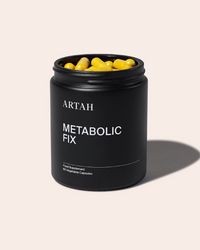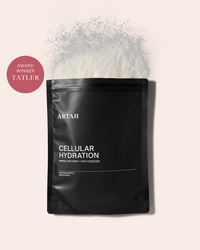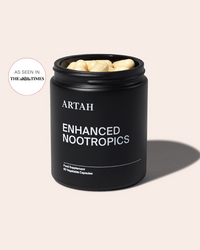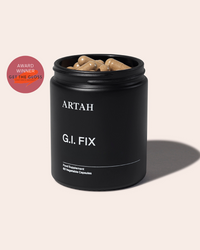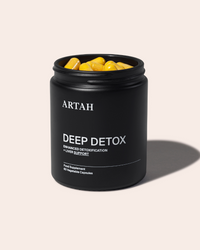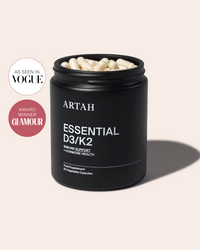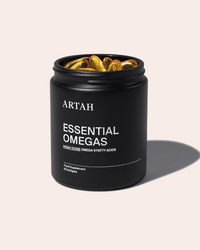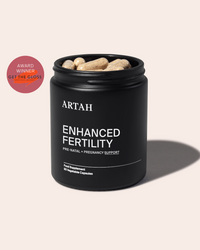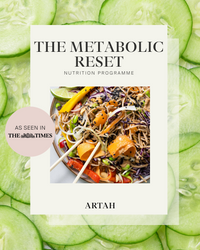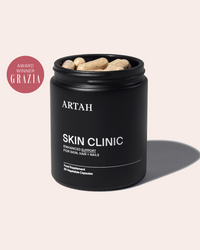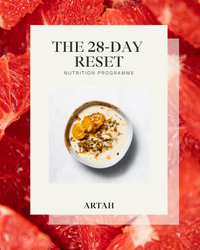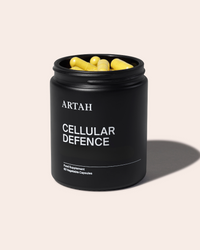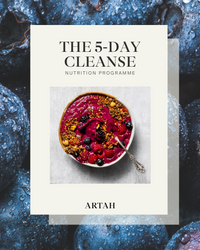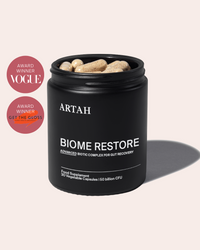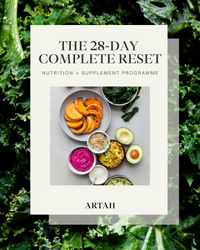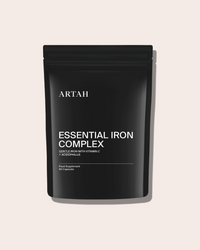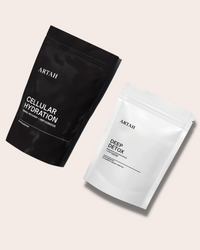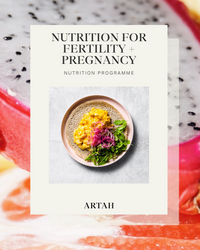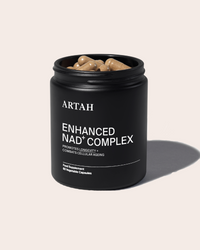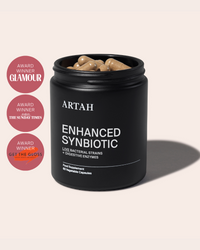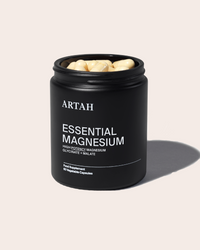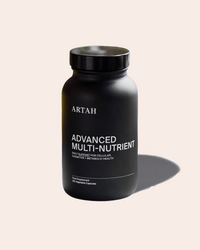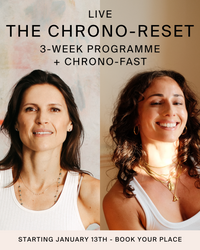How Healthy is Your Microbiome? 4 Signs You're Out of Balance
Our gut microbiome is comprised of trillions of bacteria, fungi, and viruses. It governs a host of metabolic processes including hormone regulation, immune response, inflammation and emotional wellbeing, which is why having a healthy, diverse microbiome is one of the cornerstones of wellbeing. However, a healthy microbiome is becoming more the exception than the norm as an imbalance in the microbiome, known as dysbiosis, is rising. Dysbiosis is characterized by a decrease in microbial diversity and an increase in pro-inflammatory microbial species; in essence, the harmful bacteria outnumber the beneficial ones. A dysbiotic microbiome can produce genotoxins, leaves us more susceptible to illness and infection, and can trigger inflammation, so whilst most of us still assume that a gut issue = gut symptoms, this isn’t always the case. Because our microbiome impacts so many aspects of our health, it can manifest itself across virtually every system. Here are some common signs of dysbiosis.
What causes Dysbiosis?
Disruption to the gut microbiota can also occur due to factors such as, stress, high alcohol consumption, a diet rich in ultra-processed foods, lack of fibre, illness and infection. (3). Frequent use of medications, especially antibiotics, can disrupt the delicate balance of gut bacteria by wiping out both beneficial and harmful strains. (4,5,6) Because overgrowth of harmful bacteria can manifest in various ways, it is more common than we might think. Small Intestine Bacterial Overgrowth (SIBO), for instance, is estimated to affect approximately 10.8 million people in the UK, according to NHS reports, with thousands more undiagnosed (6). Here are some signs that you might be experiencing dysbiosis:
Chronic Fatigue
Chronic fatigue has surfaced as a reliable sign of dysbiosis from gut-derived inflammation. (8) A study published in the Molecular Psychiatry Journal has shown that dysbiosis induces an inflammatory state, which compromises the integrity of the gut lining, creating a permeable barrier that allows harmful substances to seep into the bloodstream. (8) This results in flu-like symptoms, notably marked by persistent fatigue, diminished pleasure, and motivation, and eventually, can influence autoimmunity, fertility and more. Fatigue, in this context, acts as a mechanism to conserve the body's energy and facilitate recovery from heightened inflammation. (8)
Digestive Issues (FGID / IBS)
The more obvious manifestation of dysbiosis is in issues directly associated with the gut. Dysbiosis is linked to the development of functional gastrointestinal disorders (FGID), a category of symptoms which include which include IBS, acid reflux, constipation, bloating, and abdominal pain, and in inflammatory bowel diseases such as Crohn's Disease. (9) Approximately 13 million people in the UK suffer from IBS and it’s estimated that a whopping 40% of individuals globally suffer from a FGID. (6,7) IBS is more prevalent in women, but affects individuals of all ages, and in about 80% of cases, there is an associated bacterial overgrowth. Dysbiosis contributing to FGID can result from sudden changes, like food poisoning or a viral infection, but can also be caused by persistent inflammation from diet, stress, or lifestyle habits, which in turn, causes a weakening the intestinal barrier. Damage to our gut lining may exacerbate symptoms like bloating, pain, diarrhoea, and fatigue.
Recurrent Yeast and UTI Infections
Yeast infections and UTIs are incredibly common, and a large proportion of women will experience one or both within their lifetime, but if the infections are recurrent, it’s a good sign towards working on the micriobiome. UTI’s often occur because of dysbiosis in the urinary tract, known as the "urobiome”; excess harmful bacteria in the urobiome increases the risk of kidney stones, UTIs, and lower urinary tract dysfunction. A recent review in the International Journal of Molecular Science identified that elevated E. coli bacteria in the urinary tract of children was responsible for around 90% of UTIs in girls and 80% of UTIs in boys. (11) The children also showed reduced bacterial diversity, specifically in the Enterobacter family. (11) The review emphasised the importance of tipping the balance in favour of protective bacteria, like Lactobacillus, to maintain a healthy vaginal pH and outcompete harmful strains to effectively prevent future UTIs.
75% of women have had a yeast infection, with 45% having them more than once and up to 10% of women getting more than four each year; which in addition to being extremely uncomfortable, can take its toll on emotional wellbeing. Candida overgrowth is usually rare in a healthy gut, but it is an opportunistic fungus, so when Dysbiosis is present, Candida can grow uncontrolled.
Skin Issues
The condition of our skin can reflect imbalances in the gut microbiome. Dysbiosis can affect the immune system, leading to skin issues like atopic dermatitis, psoriasis, acne, dandruff, and even skin cancer(14). Gut metabolites, like butyrate, can directly change the outer layer of our skin through the bloodstream and lymphatic system. Lifestyle factors, particularly diet, also contribute to this relationship. The Western diet, marked by reduced microbial diversity and inflammatory effects, harms our intestinal gut barrier. At the same time, our skin barrier is often compromised, resulting in similar consequences such as inflammation and diminished antimicrobial peptides. (14)
Your Dysbiosis Toolkit:
When it comes to dysbiosis, it’s important to take a holistic approach that focuses the dietary and lifestyle factors that can influence the microbiome whilst also working to restore microbial balance through targeted supplements and functional foods.
Functional foods:
- Increasing fermented foods, fibre, and plant diversity is the trifecta for microbial diversity. If you have uncomfortable gut symptoms, like bloating or gas, add slowly. A sudden increase in fibre and ferments can exacerbate bloating because of their microbial activity.- Look for raw, unpasteurized sauerkraut, pickles, kimchi, and small amounts of Kombucha (note: kombucha may not be suitable for those with severe candida). The goal is little and often, working your way up to daily servings of fermented foods.
- As you increase your vegetable intake to hit your diversity goal (the magic number seems to be 30), start with lower FODMAP varieties, which can be easier on the stomach: Aubergine, green beans, Bok choy, bell peppers, carrot, cucumber, lettuce, alfalfa, endive, olives, parsnip, potato, pumpkin, spinach, summer squash, courgette, bamboo shoots, tomato, turnip, chard, cassava, Chinese cabbage, fennel, nori, kale, ginger, turmeric, basil, oregano, rosemary, thyme, cilantro, parsley, dill, mint, all spices, leek (greens), radish.
- Introduce natural antimicrobial and anti-inflammatories like fresh garlic, turmeric, horseradish and ginger, and herbs that combat dysbiosis like rosemary, thyme, cloves, black cumin seeds, and oregano.
Antimicrobial supplements:
- An antimicrobial supplement can effectively combat pathogenic bacteria and help reduce inflammation in the gut, which is critical to the restoration of the microbiome.
- Grapefruit seed extract is a powerful natural antibacterial with strong data supporting its effectiveness in candida, fungal infections, UTIs, dysbiosis, and gut related Eczema (12).
- Berberine, have been shown to act like ‘selective antibiotics’, reducing harmful bacterial whilst promoting the growth of key beneficial species, like Akkermansia municiphilia.
- Our go-to antimicrobial is GI Cleanse, which has both these herbs and other targeted antimicrobials like caprylic acid, black walnut, and more.
- Try Biome Restore. In addition to clinically studied strains of live bacteria shown to improve symptoms of IBS, Biome Restore has Lion’s Mane, a nootropic mushroom which has been shown to inhibit H. Pylori and E. Coli in the gut.
Avoid Antibiotic Overuse:
- While antibiotics are essential for treating bacterial infections, their overuse can disrupt the balance of gut bacteria. Use antibiotics only when absolutely necessary and consult with a healthcare professional before use. If you’ve been in a cycle of frequent antibiotic use, gut and immune support is paramount. Try The 28-Day Reset alongside GI Cleanse and Biome Restore to reduce inflammatory foods, target dysbiosis, and support immunity. In addition to antibiotics, other over the counter medications can disrupt gut bacteria, so be mindful of NSAID frequency, like Ibuprofen.
Take a Break From Alcohol:
- Alcohol diminishes microbial diversity and can directly contribute to imbalances in the gut. Those with pre-existing gut conditions, such as IBS, might be particularly sensitive to the impact of alcohol, potentially leading to the worsening of symptoms.
Stress Management:
- Chronic stress can both contribute to and exacerbate dysbiosis. Look to incorporate stress-reducing activities such as meditation, breathwork, yoga, or other mindfulness practices; even if it’s just 5 minutes a day.
Regular Exercise:
- Regular exercise and maintaining healthy muscle mass is important for the microbial health; there’s even a gut-muscle axis. Our microbiota can impact muscle mass, muscle quality and muscle function, and likewise, the health of our muscles can influence the activity of our microbes. Moderate and vigorous cardiovascular and strength training have been shown to positively influence microbial diversity, but it’s important to exercise intuitively and modify your routine if your body is fatigued or under stress. If this is the case, consider gentler forms of movement; choosing exercise routines that align with your body's needs can contribute to a healthier gut environment.
SHOP THE ARTICLE
Disclaimer: The information is presented in this article is for educational purposes only and is not intended to diagnose, prevent, or treat any medical or psychological conditions. The information is not intended as medical advice nor should it replace the advice from a doctor or qualified healthcare professional. Please do not stop, adjust, or modify your dose of any prescribed medications without the direct supervision of your healthcare practitioner.
References:
-
Valdes AM, Walter J, Segal E, Spector TD. Role of the gut microbiota in nutrition and health. BMJ. 2018. 13;361:k2179.
-
Marta Gómez de Cedrón, Ana Ramírez de Molina. Precision nutrition to target lipid metabolism alterations in cancer. Precision Medicine for Investigators, Practitioners and Providers, Academic Press: 2020. Pages 291-299
-
Ramirez J, Guarner F, Bustos Fernandez L, Maruy A, Sdepanian VL, Cohen H. Antibiotics as Major Disruptors of Gut Microbiota. Front Cell Infect Microbiol. 2020 Nov 24;10:572912
-
Shaohui G , Liping Y, Feng C , Zhumou Z, Jiangbo L , Wenbo L , Yujie L , et al. Gut Microbiota Are Associated With Psychological Stress-Induced Defections in Intestinal and Blood–Brain Barriers. Frontiers in Microbiology. 2020. 10
-
Alessandro A, Ágeles MM, Nancy B, Prokopis K, Francisco T, Jesús V, Dolores C, et al. Association between ultra-processed food consumption and gut microbiota in senior subjects with overweight/obesity and metabolic syndrome. Frontiers in Nutrition. 2022. 9
-
Munuswamy P, Shortt C. Remote monitoring of patients with small intestinal bacterial overgrowth, IBS and food intolerances. NHS England. 2022.
-
d'Enfert C, Kaune AK, Alaban LR, Chakraborty S, Cole N, Delavy M, Daria Kosmala D, et al. The impact of the Fungus-Host-Microbiota interplay upon Candida albicans infections: current knowledge and new perspectives, FEMS Microbiology Reviews, 2021. 45 (3).
-
Safadi, J.M., Quinton, A.M.G., Lennox, B.R. et al. Gut dysbiosis in severe mental illness and chronic fatigue: a novel trans-diagnostic construct? A systematic review and meta-analysis. Mol Psychiatry. 2022 27, 141–153 (2022).
-
Wei L, Singh R, Ro S, Ghoshal UC. Gut microbiota dysbiosis in functional gastrointestinal disorders: Underpinning the symptoms and pathophysiology. JGH Open. 2021. 23;5(9):976-987.
-
Napolitano M, Fasulo E, Ungaro F, Massimino L, Sinagra E, Danese S, Mandarino FV. Gut Dysbiosis in Irritable Bowel Syndrome: A Narrative Review on Correlation with Disease Subtypes and Novel Therapeutic Implications. Microorganisms. 2023. 11(10):2369.
-
Kawalec A, Zwolińska D. Emerging Role of Microbiome in the Prevention of Urinary Tract Infections in Children. Int J Mol Sci. 2022. 14;23(2):870.
-
Neville B.A, d'Enfert C, Bougnoux M.E, Candida albicans commensalism in the gastrointestinal tract, FEMS Yeast Research, 2015. 15(7)
-
Jawhara S. How Gut Bacterial Dysbiosis Can Promote Candida albicans Overgrowth during Colonic Inflammation. Microorganisms. 2022; 10(5):1014.
-
De Pessemier B, Grine L, Debaere M, Maes A, Paetzold B, Callewaert C. Gut-Skin Axis: Current Knowledge of the Interrelationship between Microbial Dysbiosis and Skin Conditions. Microorganisms. 2021. 11;9(2):353.







